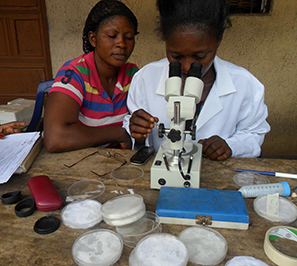“The foresight of the PMI AIRS Project in seeing to the inclusion of females in our team has enhanced access to the host communities and in no small measure has contributed to the quality of work being carried out at our sentinel site.”

A female entomology technician carrying out mosquito identification at the Enugu sentinel site. Photo credit: Dogunro Festus
The President’s Malaria Initiative Africa Indoor Residual Spraying (PMI AIRS) Project recently appointed gender focal persons in each AIRS country to promote gender inclusion and overcome socio-cultural barriers that prevent the participation of women. In Nigeria, the project carries out malaria vector surveillance in six sentinel sites across the different ecological zones. Data from the sentinel sites assist Nigeria’s National Malaria Elimination Program in making evidence-based decisions on malaria programming for the country.
AIRS Nigeria’s database manager Ifeanyi Okeke, who became the project’s gender focal person in January 2015, actively encourages research institutes to hire female entomology technicians on the project. The number of female technicians working on the project has risen from 4 to 12 this year. Surprisingly, this change increased acceptability of the project in communities and increased access to homes particularly in the northern part of the country where male technicians are denied access to some households. In addition to the benefits to the project, the new income is increasing women’s economic power to support their families.
Sani Abdullahi Fana, a technician at the Sokoto site, said, “The foresight of the PMI AIRS Project in seeing to the inclusion of females in our team has enhanced access to the host communities and in no small measure has contributed to the quality of work being carried out at our sentinel site.”
Nneka Obiageli Okafor, a female technician at the Enugu sentinel site, said, “The PMI AIRS entomology surveillance program has exposed me to the importance of adequate knowledge in malaria research. Also, the cooperation and acceptability which I enjoy both from the community members and the team is unimaginable and will continue to endear me to the field of entomology.”
As the awareness of entomology research increases, the AIRS Project plans to further erode gender barriers by recruiting more women and equipping them in the fight against malaria in the country with the world’s highest malaria burden.
This story was taken from www.africairs.net.
